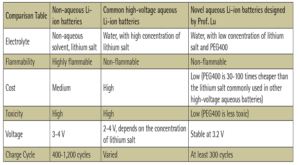Eco-friendly and stable electrolyte to enable high-voltage aqueous Li-ion battery
By EPR Magazine Editorial May 5, 2020 2:10 pm IST
By EPR Magazine Editorial May 5, 2020 2:10 pm IST

A research team led by Prof. Yi-Chun Lu from the Faculty of Engineering at The Chinese University of Hong Kong (CUHK) has taken a critical step forward to improve high-energy batteries by introducing a novel electrolyte to aqueous Li-ion battery. This electrolyte is cheap, inflammable, eco-friendly and less toxic, yet creates stable voltage for common use.
The future of Li-ion battery: From metallic to aqueous
The economy and the daily life of humans largely rely on electronic devices such as cell phones and laptops. Lithium-ion batteries have been the heart of these rechargeable electronics, as they are rechargeable and can provide relatively stable energy. However, they rely on toxic and flammable materials and have already raised serious safety concerns.
In contrast, aqueous Li-ion batteries are non-flammable and do not pose any significant risks of explosion due to its water-based electrolyte. However, aqueous Li-ion batteries have been suffering from low energy-density due to the low battery cell voltage limited by water stability (1.23 Volt). Existing approaches to increase the cell voltage of aqueous batteries often involve the use of large amount of expensive and toxic salts to stabilise water molecules, which raises the issues of cost, toxicity, and environmental sustainability.
Building on their previous research of aqueous lithium-ion batteries, Prof. Lu’s team introduced a “molecular crowding” aqueous electrolyte using poly (ethylene glycol) or PEG as a stabilisation agent. PEG is a water-soluble polymer that can be easily incorporated into aqueous batteries. It is also the basis of many skin creams and is even used in toothpastes and as an anti-foaming agent in food and drinks.Using this stabilisation agent, the team successfully expanded the aqueous electrolyte stability window to 3.2 Volt and demonstrated stable battery operation for over 300 cycles using this new electrolyte. This electrolyte also enables the use of many electrode materials that cannot be used in conventional aqueous electrolytes. This research finding provides a new platform for designing an aqueous electrolyte with a large-voltage window and high stability for safe, low-cost and eco-friendly energy storage.
For more information, visit:
www.nature.com/articles/s41563-020-0667-y#Sec13

We use cookies to personalize your experience. By continuing to visit this website you agree to our Terms & Conditions, Privacy Policy and Cookie Policy.